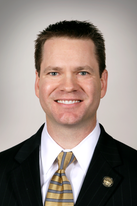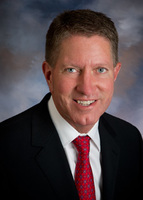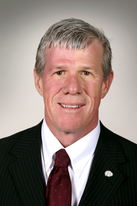Iowa House Majority Leader Chris Hagenow is committed to preserving Iowa’s “great system” of having a non-partisan commission draw new political maps following each ten-year census, he told Bleeding Heartland on February 25. Iowa’s redistricting process has been a model for the country since the 1970s. I’ve been concerned that during the next few years, Republicans might use their political power to enact a new redistricting law. Following the 2010 census, gerrymandering gave the GOP airtight state legislative majorities in Pennsylvania, Michigan, and Wisconsin, and several other states.
Since the majority leader controls which legislation reaches the Iowa House floor, I asked Hagenow after a February 25 public forum in Clive whether he would ever consider supporting a bill to change Iowa’s redistricting process. “No, we’re not doing that,” he said emphatically. Would he consider such legislation in 2019 and 2020, if Republicans still control both chambers? “No, I don’t want that. We have a great system.”
I noted that everywhere Republicans have had the trifecta during the last decade, they have gerrymandered. Hagenow responded, “We have not had that conversation. I think we’ve got a great system. I think that we should continue with that system.”
Even if Republicans retain the governorship and Iowa House and Senate majorities in 2018? “Yes. We’ve got a great system.”
A few minutes later, I put the same question to Republican Senator Charles Schneider, who serves as Iowa Senate majority whip. “I will never support that,” he said without hesitation. You will never support gerrymandering? “Nope, never.” Even if Republicans control the legislative and executive branches after 2018? “Never. What we have right now is fair.”
I will follow up with House Speaker Linda Upmeyer, Senate Majority Leader Bill Dix, and Lieutenant Governor Kim Reynolds, to see if they also will unequivocally promise to protect non-partisan redistricting in Iowa. The more Republican elected officials we can get on the record now, the better. In November, staff for Governor Terry Branstad did not respond to my e-mails seeking comment on whether the governor would rule out signing a bill that replaced the current system with rules allowing the political party in control of the legislature to draw new legislative and Congressional districts.











